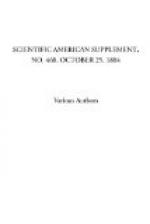Another remedy recommended by M. Megnin was the strong smelling vermifuge assafoetida, known sometimes by the suggestive name of “devil’s dung.” It has one of the most disgusting oders possible, and is not very pleasant to be near. The assafoetida was mixed with an equal part of powdered yellow gentian, and this was given to the extent of about 8 grains a day in the food. As an assistance to the treatment, with the object of killing any embryos in the drinking water, fifteen grains of salicylate of soda was mixed with a pint and three-quarters of water. So successful was this, that on M. De Rothschild’s preserves at Rambouillet, where a few days before gapes were so virulent that 1,200 pheasants were found dead every morning, it succeeded in stopping the epidemic in a few days. But to complete the matter, M. Megnin adds that it is always advisable to disinfect the soil of preserves. For this purpose, the best means of destroying any eggs or embryos it may contain is to water the ground with a solution of sulphuric acid, in the proportion of a pennyweight to three pints of water, and also birds that die of the disease should be deeply buried in lime.
Fumigation with carbolic acid is an undoubted cure, but then it is a dangerous one, and unless very great care is taken in killing the worms, the bird is killed also. Thus many find this a risky method, and prefer some other. Lime is found to be a valuable remedy. In some districts of England, where lime-kilns abound, it is a common thing to take children troubled with whooping-cough there. Standing in the smoke arising from the kilns, they are compelled to breathe it. This dislodges the phlegm in the throat, and they are enabled to get rid of it. Except near lime-kilns, this cannot be done to chickens, but fine slaked lime can be used, either alone or mixed with powdered sulphur, two parts of the former to one of the latter. The air is charged with this fine powder, and the birds, breathing it, cough, and thus get rid of the worms, which are stupefied by the lime, and do not retain so firm a hold on the throat. An apparatus has recently been introduced to spread this lime powder. It is in the form of an air-fan, with a pointed nozzle, which is put just within the coop at night, when the birds are all within. The powder is already in a compartment made for it, and by the turning of a handle, it is driven through the nozzle, and the air within the coop charged with it. There is no waste of powder, nor any fear that it will not be properly distributed. Experienced pheasant and poultry breeders state that by the use of this once a week, gapes are effectually prevented. In this case, also, I shall be glad to learn the result if tried.
STEPHEN BEALE.
H——, Eng., Aug. 1.
—Country Gentleman.
* * * * *




